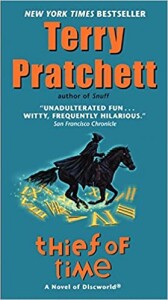 Thief of Time, the latest installment in Terry Pratchett’s highly popular Discworld series, contains all the elements that make the series such a hit: Vivid, fish-out-of-water humans caught in a conundrum they must solve by their wits and dogged determination; the bizarre culture- and genre-crossing mix of characters ranging from faux Tibetan monks and mad scientists to querulous dwarves and stolid trolls; English-style humor rife with puns and pop-culture references; and of course Discworld itself, the odd world shaped not like a globe but like a platter.
Thief of Time, the latest installment in Terry Pratchett’s highly popular Discworld series, contains all the elements that make the series such a hit: Vivid, fish-out-of-water humans caught in a conundrum they must solve by their wits and dogged determination; the bizarre culture- and genre-crossing mix of characters ranging from faux Tibetan monks and mad scientists to querulous dwarves and stolid trolls; English-style humor rife with puns and pop-culture references; and of course Discworld itself, the odd world shaped not like a globe but like a platter.
But the main characters in Thief are not humans at all. They’re ideas, philosophical constructs, avatars, and they’re used to explore some pretty heavy concepts about the nature of time and humanity.
The book’s plot centers on one Miss Susan, a beloved school teacher in Ankh-Morpork who ignites her young students’ passion for learning. She also happens to be a human-immortal hybrid, the granddaughter of Death — you know, the skeleton guy in the hooded cape who sometimes carries a scythe? Her grandfather enlists her in a quest to stop a plot by The Auditors to halt time, thus ending the disturbances caused in their orderly universe by the pesky presence of people.
Subplots, which in the way of these things weave around the main story line until they become integral parts of it, involve a mentally ill clockmaker, a powerful and wise monk disguised as a humble janitor, and a young Oliver Twist-type thief who seems to possess powers beyond his ken. Hilarious minor characters include the Death of Rats, a servant named Igor, and a cranky toddler who is the latest incarnation of the abbot of the Monks of History.
Pratchett uses Death and his cronies — avatars like Destiny, Famine, Pestilence and War — to comment on the human condition and its penchant for giving human characteristics to its gods. “We are envisaged as human by humans and thus, in various fashions, we take on some aspects of humanity,” says Death. “We pick up human traits … curiosity, anger, restlessness.”
Miss Susan, being part-human, part-immortal, also is a trenchant observer of humankind’s perversity. “If you put a large switch in some cave somewhere, with a sign on it saying ‘End-of-the World Switch. PLEASE DO NOT TOUCH,’ the paint wouldn’t even have time to dry.”
Wrap up all this philosophizing in an entertaining story with martial arts effects that make Crouching Tiger, Hidden Dragon look like child’s play, plus a laugh-aloud pun, joke or punchline on nearly every page, and you have another winner from Discworld. Read it while there’s still time.
(Harper Collins, 2001)
